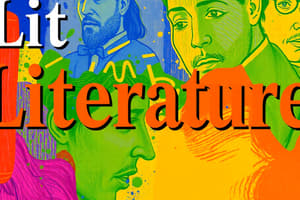Podcast
Questions and Answers
What is the term 'literature' derived from?
What is the term 'literature' derived from?
Latin term 'littera'
Which of the following are characteristics of literature? (Select all that apply)
Which of the following are characteristics of literature? (Select all that apply)
- Combines charm and power (correct)
- Resonates with readers (correct)
- Exclusively factual information
- Captures the essence of nature (correct)
Oral literature is dependent on written records.
Oral literature is dependent on written records.
False (B)
What is one purpose of oral literature?
What is one purpose of oral literature?
What is a reason why people write?
What is a reason why people write?
What type of literature includes novels, poems, essays, and plays?
What type of literature includes novels, poems, essays, and plays?
Great literature possesses ___________.
Great literature possesses ___________.
Which of the following describes the universality of great literature?
Which of the following describes the universality of great literature?
Match the qualities of great literature with their descriptions:
Match the qualities of great literature with their descriptions:
Define 'suggestiveness' in the context of literature.
Define 'suggestiveness' in the context of literature.
Study Notes
Definition and Purpose of Literature
- Literature originates from the Latin “littera,” meaning “letter,” encompassing all written works.
- It includes various forms such as poetry, fiction, essays, and plays.
- Captures the essence of nature, life, and human experiences, showcasing the unique voice of each author.
- Exists in diverse artistic forms that resonate with readers and listeners.
Types of Literature
- Oral Literature
- Thrives on ancient storytelling traditions, transmitted orally without written records.
- Serves the purpose of sharing emotions and joy through stories.
- Transmitted orally across generations, including folktales, epic poems, myths, and legends.
- Written Literature
- Arises from authors’ pens, creating lasting works that remain unchanged once recorded.
- More permanent than oral traditions, with examples including novels, poems, essays, and plays.
Reasons Why People Write
- Self-Expression: Enables individuals to express their internal thoughts and emotions.
- Knowledge Sharing: Facilitates dissemination of information and collective learning.
- Preservation of Ideas and Values: Keeps cultural values and concepts alive through generations.
- Conveying Truth and Evaluation: Communicates truth, accuracy, and fosters critical assessments.
Qualities of Great Literature
- Permanence: Great literature lasts through ages, providing new insights across generations.
- Universality: Transcends cultural and geographic boundaries, appealing to diverse audiences.
- Artistry: Captivates through aesthetic beauty and creative expression.
- Intellectual Value: Stimulates thought and enhances cognitive abilities.
- Spiritual Value: Inspires reflections on moral values and connects with humanity’s deeper aspirations.
- Distinctive Style: Each author's unique perspective contributes to the richness of literature.
- Suggestiveness: Evokes emotions, sparks imagination, and envisions experiences beyond the ordinary.
Summary
- Both oral and written literature enrich lives, transcending time and fostering connections through shared experiences and ideas.
Studying That Suits You
Use AI to generate personalized quizzes and flashcards to suit your learning preferences.
Related Documents
Description
This quiz offers an in-depth look into the definition and purpose of literature. It highlights the various forms that literature can take, such as poetry, essays, and fiction. Engage with key concepts while exploring the artistic expressions of written works.




